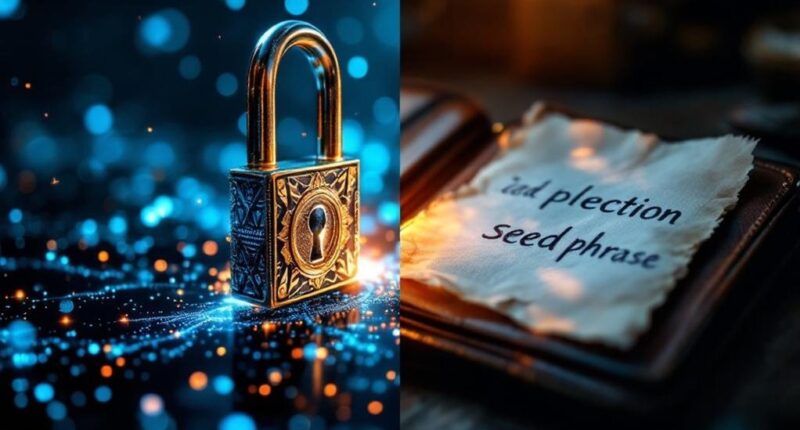When diving into the world of cryptocurrency, few concepts are as fundamentally important—or as frequently confused—as private keys and seed phrases. While both serve vital security functions, they differ notably in structure, purpose, and vulnerability.
A private key is fundamentally your digital signature in the crypto universe—a 64-character hexadecimal string that grants direct control over a single blockchain address. Think of it as the unique key to one specific safety deposit box. With this key, you can sign transactions and move assets, but only for that specific account.
Seed phrases, on the other hand, are the master key to your entire crypto kingdom.
The master key to your crypto kingdom, seed phrases unlock all doors where your digital treasures reside.
Usually consisting of 12 or 24 seemingly random words, these phrases might look deceptively simple—just a bunch of everyday words jotted down.
But don’t let that fool you! This verbal code can regenerate all private keys in your wallet.
It’s like having the blueprint to recreate every key you own if they get lost.
The distinction becomes crucial when considering security implications. Lose a private key? You’ve lost access to one account. Misplace your seed phrase? Your entire wallet could be gone—poof!—like a magician’s rabbit, except there’s no reveal at the end.
When it comes to daily use, private keys handle the grunt work of signing transactions and executing smart contracts. These keys are 256-digit binary strings in their raw form, making them incredibly impractical for humans to record or remember accurately.
Your seed phrase, meanwhile, sits in cold storage—ideally written down and tucked away somewhere fireproof, waterproof, and thief-proof.
It’s the emergency parachute you hope never to use.
Storage practices differ too. While both should be kept secure, seed phrases have the advantage of being human-readable. They’re easier to write down, split across locations, or even memorize (though that’s a risky proposition for most of us mere mortals with normal memory capacities).
Understanding these differences isn’t just crypto trivia—it’s essential knowledge for anyone serious about protecting their digital assets in a world where being your own bank means being your own security system too.
The hierarchical deterministic wallet algorithms ensure that your seed phrase can convert to private keys through a complex cryptographic process, allowing consistent wallet restoration across different devices.
For maximum security, many experts recommend using hardware wallets to store your private keys offline, completely isolated from potential online threats.








